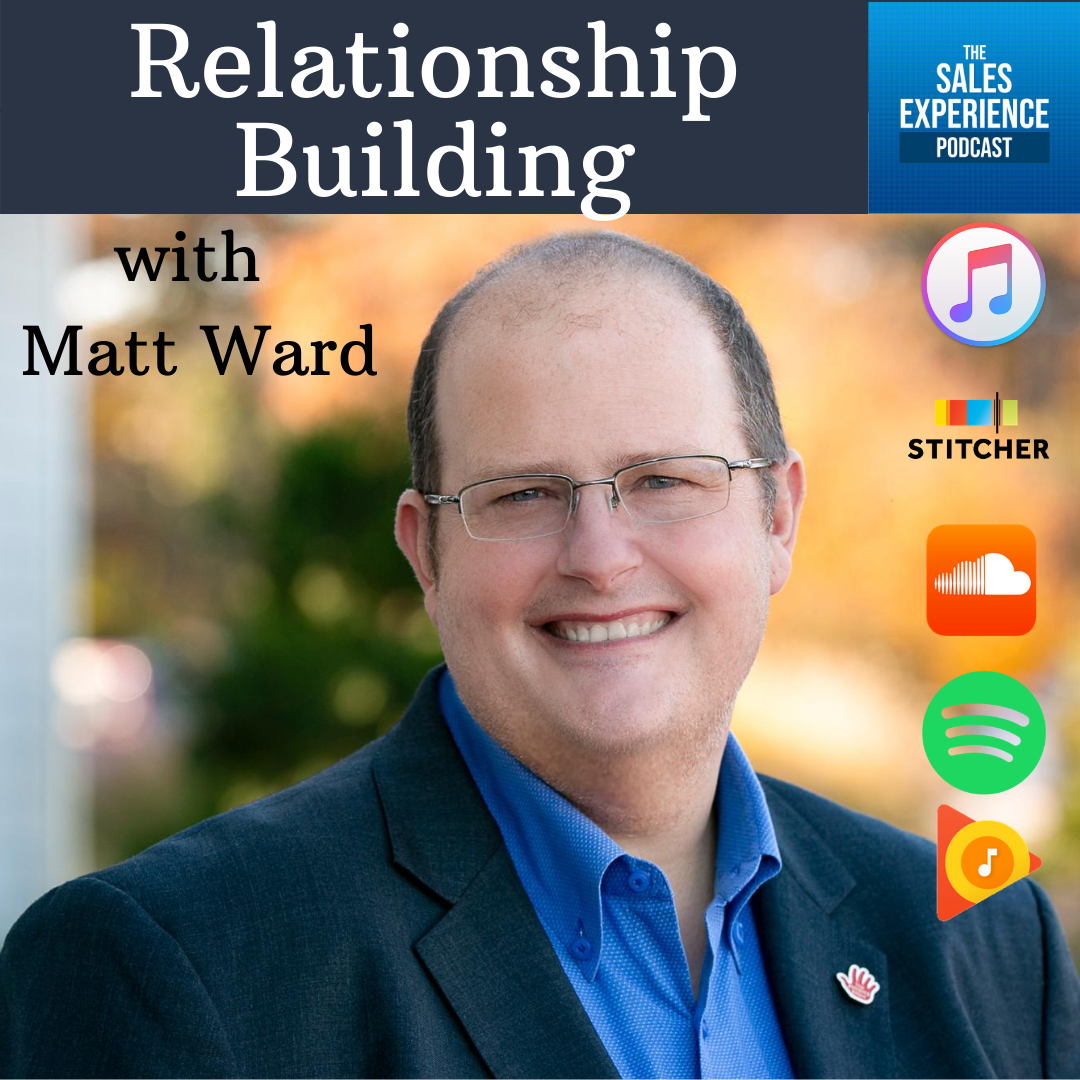Show Notes
I finally did it on the show…made a whole week about telesales = telephone sales.
Most of my sales career has been using the telephone as the primary (sending emails and texts don’t count, those can’t close actual deals) tool.
If you have been listening to the show for a while you hear me talk about phone related sales principals.
Here is a full week of episodes about telesales/inside sales.
The first topic to cover? Might seem like a ‘no duh’ subject, but it’s missed by most inside salespeople – being on the phone most of the work day.
If you are not winning in your telesales career, the first place to look is the % of your day that you are actually on the phone.
Episode 66 – Transcript
Hello and welcome to another week of the sales experience podcast. This is telesales week.
Welcome to episode 66 what is telesales? It means you’re doing sales over the phone, also referred to as inside sales. This would be compared to outside sales or retail where you’re meeting people face to face, you’re interacting with them either going directly to them or they’re coming to you in some kind of dealership or retail store location, office.
This is inside sales, meaning you’re inside reaching out to people in particular over the telephone. Now why would I spend a whole week on this? Because there’s a lot of things that apply to just telephone sales. In my experience and my focus where I’ve been a lot of my career, which has been in call centres, working with sales teams both in past careers as well as now with consulting and working with clients.
And keep in mind if you’re not in telephone sales, so you’re in retail, you’re in some kind of face to face meetings, let’s say mortgage or real estate, or you’re more on the consultative side where maybe you do some telephone calls with clients, but not at a high rate of volume.
These principles could still apply to you. My goal is to have all of these kind of gems in the conversations be applicable to anybody who’s in sales. You can take them out and apply them to you, so keep that in mind as you listen to these episodes. Even if you’re not working in a call centre, this still could help you out.
That’s my goal. Now, what do I want to talk about on the first episode of Telesales Week? Just get into it. It’s going to sound really basic. It’s going to sound silly. When I talk about this to trainees and new groups or even sales reps who are struggling, they all kind of laugh because they think I’ve lost it.
It’s too basic thing is, keep in mind if you’re in a call centre, if you’re an inside sales, the phone is your tool to closing deals and so it’s a phone job and your job is to be on the phone. That’s basically it. We could end the episode right now.
That’s the main part. If you’re in a sales role that requires the phone use the phone the majority of the time. Now what do I mean? Here’s what I see a lot. I see a lot of sales people in call centres or in cubicles or in offices where their phone is their primary tool and they don’t spend a lot of time of their day on the phone. They’re doing other things.
They have meetings, they’re preparing, they’re sending emails, they’re sending texts to clients, they’re preparing to make phone calls, and they’re preparing to send emails. They’re following up after phone calls and doing a lot of admin stuff.
They’re spending a lot of their time doing everything but being on the phone. If your job is to close deals over the phone, you should be on the phone the majority of the time.
Now, keep in mind, and I’m going to go to the other end of the spectrum, is if you have an eight hour day, so nine hours minus lunch breaks, whatever that is, let’s say out of an eight hour productive time on the floor at your desk where you should be working out of those eight hours, it’s not reasonable or even responsible to expect eight hours of phone time.
If you’re on the phone eight hours a day out of eight hours, at some point you’ll burn out. You’ll melt your brain. You will lose your voice, which I’ve seen people do as well since you can’t sustain that. Now, some days you’ll have that where it’s literally nonstop back to back.
Lots of phone calls. Maybe it’s eight hours out of eight hours that you’re on the phone and just on fire and you’ll find that that works really well. It feels great, but you can’t sustain it. I’m going to guess the next day you’re going to come in tired, burnt out. You can do that a few days a week, but you can’t do that five days a week.
It’s just a high level. That’s just impossible, right? If we talk about athletes, athletes can perform at a very high level for those 48 minutes of the basketball game and then downtime and even in addition to that, they also have an off season where literally they’re recuperating for three months doing some practice, keeping in shape, working on some skills, but not playing games all the time.
So they have an off season, which most salespeople don’t have an off season. Most professionals don’t have an off season, so keep that in mind.
So I’m not saying out of an eight hour day should be on the phone eight hours. What I’m saying is based on my experience for most people out of an eight hour day, if you want to be successful, if you want to hit your numbers, if you want to make money, if you want to achieve the goals that you have on your vision board and why you come to work every day and what’s driving you, then you should be on the phone at least five hours a day.
Talk time of five hours a day on average. Now, of course, you’ll have your good days where everybody answers, all of your appointments show up or you get lots of phone calls coming in and they’re all successful. It’s easy to hit that five hours. Then you have other days where it’s just a rough contact day. You’re making 150 outbound calls and nobody’s answering.
You’re leaving 150 messages for 150 minutes of talk time, so you’re on the phone for two and a half hours. That happens. As long as you’re putting in the effort and you’re keep trying for those eight hours. It’s all about the long term.
How are you averaging for the week and what are you doing each day? Again, this may seem like a silly topic for me to literally spend this first episode of telesales week telling you that if you have a phone job that you should be on the phone.
Most of the time might sound silly, but again, I’m saying this based on my experience of seeing so many reps in so many different offices and call centres where they just aren’t on the phone. If you’re managing a sales team, you know this, it’s a constant battle to get people to be on the phone and the solution for this is if you’re struggling with being on the phone, majority of the time you need to do some self-assessment and figure out exactly why you’re procrastinating.
Why are you struggling? There’s something that’s keeping you from being on the phone, and I talked about a lot of stuff last week in mind set. I’ve talked about it before with having a y, the vision board that I mentioned.
He has a lot of things that go into it, but what is it that you’re afraid of? Why are you procrastinating? Are you unhappier in your position? Do you not have the right tools? There’s something that’s keeping you from being on the phone and that’s really what you want to address.
It’s not about management telling you to be on the phone. It’s about you wanting to be on the phone because you understand that’s the greatest tool that you have to be successful. One thing see people do is they try to take the easy way out. They want to send emails. They want to send text messages or chats to prospects and turn them into clients.
That doesn’t work. You can’t enrol anybody into something whenever you’re trying to sell via email. SMS Chat doesn’t work. Now you could sell somebody into something that’s a commodity if you’re just an order taker and people will just buy it that way, but if you’re trying to enrol somebody into something that takes some kind of conversation, you can’t do it via those methods. You have to do it over the phone or face to face.
It just doesn’t work. It’s like a relationship in any other way. Let’s say a personal relationship where you’re trying to get somebody to agree to a date. You might get the date via email or SMS or chat, whatever that might be. However, there’s still got to be a date, there’s got to be a conversation, and there’s got to be something in order to see if it’s a good fit and maybe move that forward.
Same thing with telephone sales. It’s all about the phone, so make sure you’re spending the majority of your time on the phone. I can’t stress that enough. If you’re not finding the success that you need, look at how much talk time you have, how much effort you’re really putting in, and if you’re not doing that effort and that level of work that’s needed, why not? So keep that in mind.
All right, hope that helps. Please make sure to subscribe wherever you’re downloading these podcasts from iTunes, Stitcher, Soundcloud, Spotify, Google, play music, the cutter consulting group.com website. And if you’re a sales manager or team leader and owner who has a sales team and you are seeing that your sales reps are struggling with being on the phone the majority of the time to get the efforts that they need and they’re struggling with that, please let me know.
Please chat with me through the cutter consultant group.com website or go to LinkedIn and find me on there. Send me a message. Let’s get on a phone call. There’s lots of different ways I can help figure out why that’s happening and then how we get everyone excited to use the phone as the wonderful, amazing tool that it is and still is.
A lot of people think phone calls are dead and nobody wants to talk on the phone, but that’s just fundamentally not true. Still. A lot of people, even millennials, still want to do some stuff over the phone, want to have that human connection and it’s so important. So let me help your team. That’s it for another episode of the sales experience podcast.
Always, remember that everything in life is sales and people remember the experience you gave them.
![[E66] Telesales Week: Get on the phone](https://episodes.castos.com/salesexperiencepodcast/images/TSEP-Cover-Telesales-Week.png)


